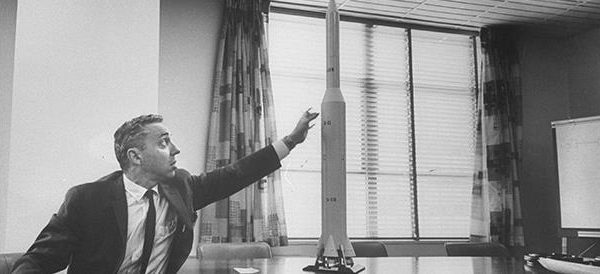

Dyer Brainerd Holmes with a model of the Saturn C-5 rocket. His work was crucial for the Apollo program (Credits: Getty)
Dyer Brainerd Holmes, NASA’s director of human space flight program in the early ‘60s, died on January 11 at the age of 91. Holmes, who is survived by his wife and two daughters, passed away due to complications from pneumonia.
“When a great nation is faced with a technological challenge, it has to accept or go backward,” said Mr. Holmes to Time magazine in 1962 “Space is the future of man, and the U.S. must keep ahead in space.”
Dyer Brainerd Holmes was born in Brooklyn in 1921, and served as an Ensign in the U.S Navy reserves during World War II. Before joining NASA, he worked at Radio Corporation of American, where he had a major role developing the Talos and Atlas missiles. He also managed the Ballistic Missile Early Warning System, a project designed to detect Soviet missiles launched toward the United States. In 1961, Holmes joined NASA overseeing the Mercury program when John Glenn became the first astronaut to orbit around Earth on February 20, 1962. He left NASA in 1963, due to a perceived interference in the program by NASA administrator James E. Webb. Under his short but significant term, the Gemini and Apollo programs were developed to their full potential, and his departure was seen as a serious setback to the Apollo program. Mr. Holmes then became executive at Raytheon and became president of the company before retiring in 1986.
During his short period at NASA, Mr. Holmes strenuously defended the idea that the scientific and military credibility of the U.S. was dependent on the space program. Opposition to this idea came from politicians at all levels, ranging from congressmen up to former President Dwight Eisenhower, who believed that the Moon was not worthy of billions of dollars worth of investments.
“We have plenty of skeptics,” he said in 1962. “They’re all over the place, and loud. But the head of the project can’t be a skeptic.”

















































































































![A trajectory analysis that used a computational fluid dynamics approach to determine the likely position and velocity histories of the foam (Credits: NASA Ref [1] p61).](https://www.spacesafetymagazine.com/wp-content/uploads/2014/05/fluid-dynamics-trajectory-analysis-50x50.jpg)



Leave a Reply